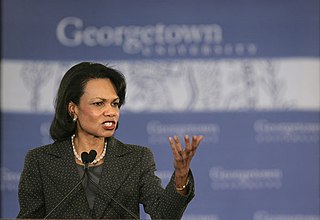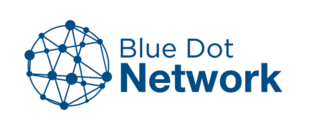
The United States Department of State (DOS), or simply the State Department, is an executive department of the U.S. federal government responsible for the country's foreign policy and relations. Equivalent to the ministry of foreign affairs of other nations, its primary duties are advising the U.S. president on international relations, administering diplomatic missions, negotiating international treaties and agreements, and representing the U.S. at the United Nations. The department is headquartered in the Harry S Truman Building, a few blocks from the White House, in the Foggy Bottom neighborhood of Washington, D.C.; "Foggy Bottom" is thus sometimes used as a metonym.
In international relations, public diplomacy or people's diplomacy, broadly speaking, is any of the various government-sponsored efforts aimed at communicating directly with foreign publics to establish a dialogue designed to inform and influence with the aim that this foreign public supports or tolerates a government's strategic objectives. These also include propaganda. As the international order has changed over the twentieth century, so has the practice of public diplomacy. Its practitioners use a variety of instruments and methods ranging from personal contact and media interviews to the Internet and educational exchanges.
Charlotte Beers is an American businesswoman and former under secretary of state for public diplomacy and public affairs in the George W. Bush administration.
Track II diplomacy or "backchannel diplomacy" is the practice of "non-governmental, informal and unofficial contacts and activities between private citizens or groups of individuals, sometimes called 'non-state actors'". It contrasts with track I diplomacy, which is official, governmental diplomacy that occur inside official government channels. However, track two diplomacy is not a substitute replacement for track one diplomacy. Rather, it is there to assist official actors to manage and resolve conflicts by exploring possible solutions derived from the public view and without the requirements of formal negotiation or bargaining for advantage. In addition, the term track 1.5 diplomacy is used by some analysts to define a situation where official and non-official actors cooperate in conflict resolution.

In the United States Government, the Bureau of East Asian and Pacific Affairs is part of the United States Department of State and is charged with advising the Secretary of State and Under Secretary of State for Political Affairs on matters of the Asia-Pacific region, as well as dealing with U.S. foreign policy and U.S. relations with countries in that area. It is headed by the Assistant Secretary of State for East Asian and Pacific Affairs, who reports to the Under Secretary of State for Political Affairs.

The Bureau of Near Eastern Affairs (NEA), also known as the Bureau of Near East Asian Affairs, is an agency of the Department of State within the United States government that deals with U.S. foreign policy and diplomatic relations with the nations of the Near East. It is headed by the Assistant Secretary of State for Near Eastern Affairs, who reports to the Under Secretary of State for Political Affairs.

The Elliott School of International Affairs is the professional school of international relations, foreign policy, and international development of the George Washington University, in Washington, D.C. It is highly ranked in international affairs and is the largest school of international relations in the United States.
Under Secretary of State (U/S) is a title used by senior officials of the United States Department of State who rank above the Assistant Secretaries and below the Deputy Secretary.

The Global AIDS Coordinator at the United States Department of State is the official responsible for overseeing U.S.-sponsored humanitarian aid programs to combat the AIDS epidemic around the world. The Global AIDS Coordinator has the rank of Ambassador-at-Large and Assistant Secretary.

The Bureau of Educational and Cultural Affairs (ECA) of the United States Department of State fosters mutual understanding between the people of the United States and the people of other countries around the world. It is responsible for the United States' cultural exchange programs.

Transformational Diplomacy is a diplomacy initiative championed by former United States secretary of state Condoleezza Rice for reinvigorating American Foreign Policy and the United States Foreign Service.

Diplopedia, billed as the Encyclopedia of the United States Department of State, is a wiki running on a State internal Intranet, called "OpenNet". It houses a unique collection of information pertaining to diplomacy, international relations, and Department of State tradecraft.

David Saranga is Israel's ambassador in Romania. He served as the Senior Foreign Affairs Advisor to the President of the State of Israel, Reuven (Ruvi) Rivlin, and former Head of European Parliament Liaison Department at the Israeli embassy in Brussels. Prior to that he served as Consul for Media and Public Affairs of Israel in the United States. Saranga was responsible for Israel's image in the United States and was the liaison person of Israel to the American media. The Jewish Chronicle described him as "The man whose campaigns are rebranding Israel." Saranga's initiative to invite Maxim magazine to Israel generated debate about the definition of public diplomacy. Prof. John H. Brown of Georgetown University described this initiative as the first event in a new branch of Public Diplomacy. Saranga was the first diplomat who implemented Web 2.0 governmental initiatives, including the first official blog of a country, a MySpace page, YouTube channel, Facebook page and a political blog.

Macon Phillips is a U.S. public servant who served as the Coordinator of the United States Department of State Bureau of International Information Programs from 2013 to 2017. He reported to Rick Stengel, the Under Secretary for Public Diplomacy and Public Affairs. Phillips is the former White House Director of New Media, in which capacity he had oversight responsibility for WhiteHouse.gov. Phillips' work on WhiteHouse.gov closely coordinated with internet operations at the Democratic National Committee, which has responsibility for administration of the BarackObama.com domain and website. At precisely 12:00 p.m.ET during the inauguration of Barack Obama, Phillips oversaw the conversion of Whitehouse.gov, the official website of the President of the United States. At 12:01 p.m., he posted the site's first blog entry, titled: Change has come to WhiteHouse.gov.
US Secretary of State Hillary Clinton asked for the creation of an online forum for State Department employees to submit ideas directly to the Secretary. The Sounding Board was an intranet blog developed and launched in February 2009 by staff from the State Department's Office of eDiplomacy.

Cyber-diplomacy is the evolution of public diplomacy to include and use the new platforms of communication in the 21st century. As explained by Jan Melissen in The New Public Diplomacy: Soft Power in International Relations, cyber-diplomacy “links the impact of innovations in communication and information technology to diplomacy.” Cyber-diplomacy is also known as or is part of public diplomacy 2.0, EDiplomacy, and virtual diplomacy. Cyber-diplomacy has as its underpinnings that, “it recognizes that new communication technologies offer new opportunities to interact with a wider public by adopting a network approach and making the most of an increasingly multicentric global, interdependent system.”

Culinary diplomacy, gastrodiplomacy or food diplomacy is a type of cultural diplomacy, which itself is a subset of public diplomacy. Its basic premise is that "the easiest way to win hearts and minds is through the stomach". Official government-sponsored culinary diplomacy programs have been established in Taiwan, Singapore, Thailand, South Korea, Malaysia, Indonesia, Lebanon, Peru, Israel, the United States, Cambodia, Japan, Scandinavia, Australia and Uzbekistan.
Formerly known as SportsUnited, Sports Diplomacy is the U.S. Department of State's sports diplomacy division. Sports Diplomacy uses sport to help youth around the world develop important off-the-court skills, including leadership, mutual understanding and academic achievement. The four pillars of the program include Sports Envoys, Sports Visitors, Sports Grants, and the Empowering Women and Girls through Sport Initiative. The program began in 2002 and has since reached thousands of participants in more than 140 countries. An overarching theme in most of Sports Diplomacy’s programming is disability sport access and inclusion.

Thomas Ulrich Brechbuhl is a Swiss-American businessman and former government official, having held the position of Counselor of the United States Department of State from May 1, 2018, to January 20, 2021. He was appointed by and reported to Secretary of State Mike Pompeo, and replaced Maliz E. Beams. Along with the role of Counselor, he served as the Acting Under Secretary for Public Diplomacy and Public Affairs at the Department of State from March to September 2020.

The Blue Dot Network (BDN) is a multi-stakeholder initiative formed by the United States, Japan, and Australia to provide assessment and certification of infrastructure development projects worldwide on measures of financial transparency, environmental sustainability, and impact on economic development, with the goal of mobilizing private capital to invest abroad.









